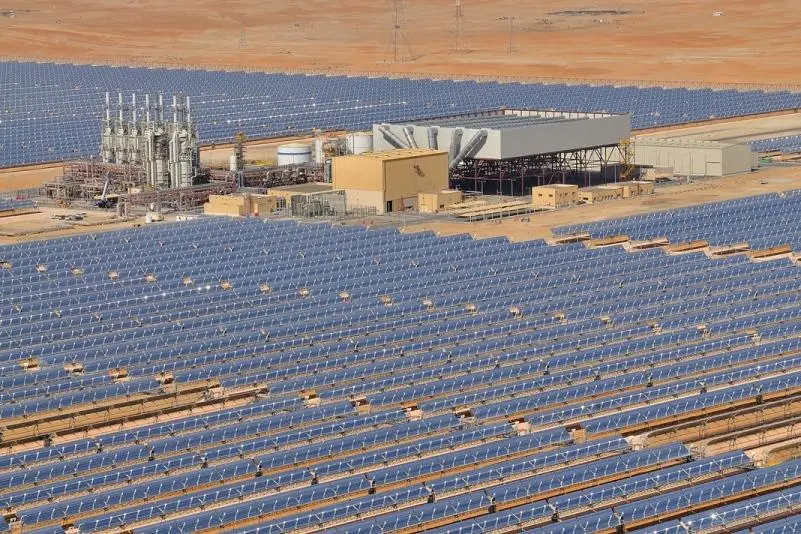PHOTO
ABU DHABI - Masdar, a subsidiary of Mubadala Investment Company and one of the world’s leading renewable energy companies, announced that it has signed a strategic agreement with the Republic of Iraq to develop Solar Photovoltaic (PV) projects in the country with a minimum total capacity of two gigawatts (GW).
Heads of Agreement were signed at a virtual ceremony by Majid A. Hantosh, Iraqi Minister of Electricity; Suha Al-Najar, President of the National Investment Commission of Iraq; and Mohamed Jameel Al Ramahi, Chief Executive Officer of Masdar.
The signing took place in the presence of Ihsan Abdul Jabbar Ismail, Iraqi Minister of Oil; Suhail bin Mohammed Al Mazrouei, UAE Minister of Energy and Infrastructure; and Dr. Thani bin Ahmed Al Zeyoudi, UAE Minister of State for Foreign Trade.
Commenting on the agreement, Ismail said, "The Government intends to increase and enhance the national production of clean energy. Through this agreement with Masdar, we will generate 2 GW of solar power through projects in central and southern Iraq. Iraq is targeting 20 to 25 percent of energy coming from renewable sources, rather than fossil fuels, equivalent to 10 to 12 GW.
"This agreement with Masdar, a global leader in renewable energy, is an important step in the development of the clean energy investment sector and the exploitation of solar energy in Iraq." Al Mazrouei, in turn, said, "We are grateful to the Government of Iraq for providing Masdar with the opportunity to contribute to the implementation of Iraq's renewable energy strategy. The UAE is committed to working with Iraq to develop sustainable energy resources. This initiative also highlights the importance of public and private sector partnerships in finding affordable solutions.
"Masdar has been a pioneer in developing clean energy projects, and is now active in more than 30 countries around the world, with a total value of more than US$20 billion and a production capacity exceeding 11 gigawatts. Masdar will leverage the expertise it has built up through these projects to support Iraq on its clean energy journey," he noted.
Al Zeyoudi underlined the strong brotherly relations that unite the UAE and Iraq, supported by many deep political, social and economic ties, and driven by the keenness of both leaderships to enhance cooperation in all fields, especially vital areas of common interest.
He pointed out that this cooperation will add significant value to the Emirati and Iraqi partnerships in addressing the challenges posed by climate change and keeping pace with the growing energy demand. It will also contribute to supporting Iraqi efforts aimed at implementing quality projects to produce 10 gigawatts of solar energy by 2025.
Al Zeyoudi re-affirmed the UAE's eagerness to facilitate channels of technology transfer, enrich knowledge and encourage the exchange of the best and most successful experiences to promote economic development in Iraq.
For her part, Al-Najar commented, "The project is one of the largest renewable photovoltaic solar projects in the Middle East, and falls within the vision of Iraq’s sustainable transition plan 2021- 2030. The project delivers 2 GW of green energy for Iraq national network." She added that a steering committee of both parties is established for this goal. The business model is Independent Power Producer, and the investment will be according to law13-2006 of the National Investment Commission.
Al-Najar said, "The project ensures clean and sustainable energy production for different areas in Iraq, and displaces carbon dioxide emissions resulting from fossil fuel generation. The project will also provide new jobs in the energy sector, with the manpower for project construction and operation beyond 2,000." Al Ramahi said, "The UAE shares Iraq’s commitment to diversify away from a dependence on oil & gas and to accelerate the transition to clean energy sources. We are proud to support the Government of Iraq on this vital stage in its clean energy journey and we will leverage our expertise to deliver a more sustainable future for the nation." Iraq, the second-largest oil producer in the Organisation of Petroleum Exporting Countries (OPEC), is looking to increase the percentage of renewables in its total power production capacity by the end of this decade to address supply issues and meet climate objectives. Iraq, which this year ratified the Paris Agreement on climate change, enjoys some of the most attractive solar irradiation levels in the region.
© Copyright Emirates News Agency (WAM) 2021.





















